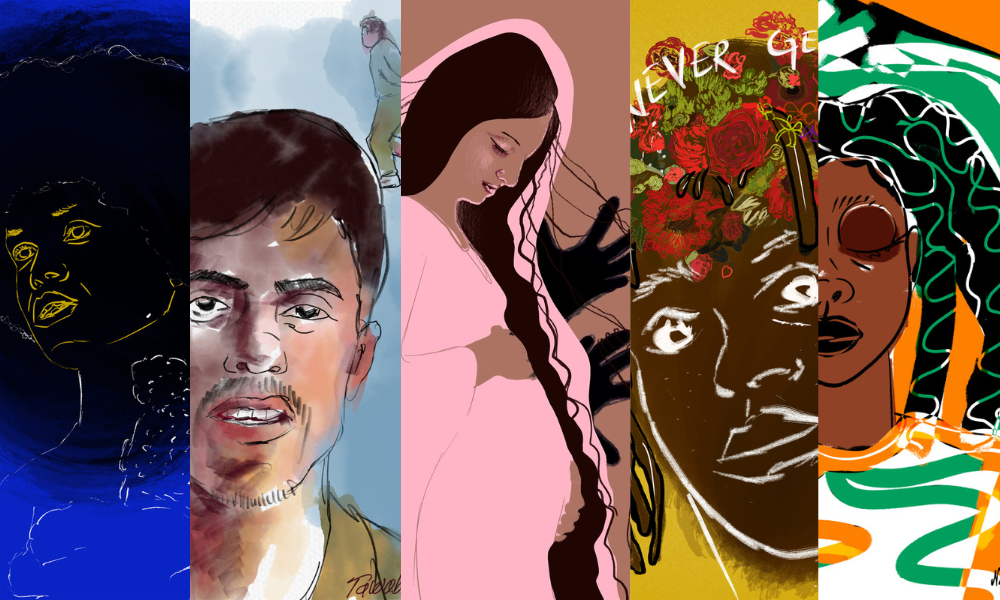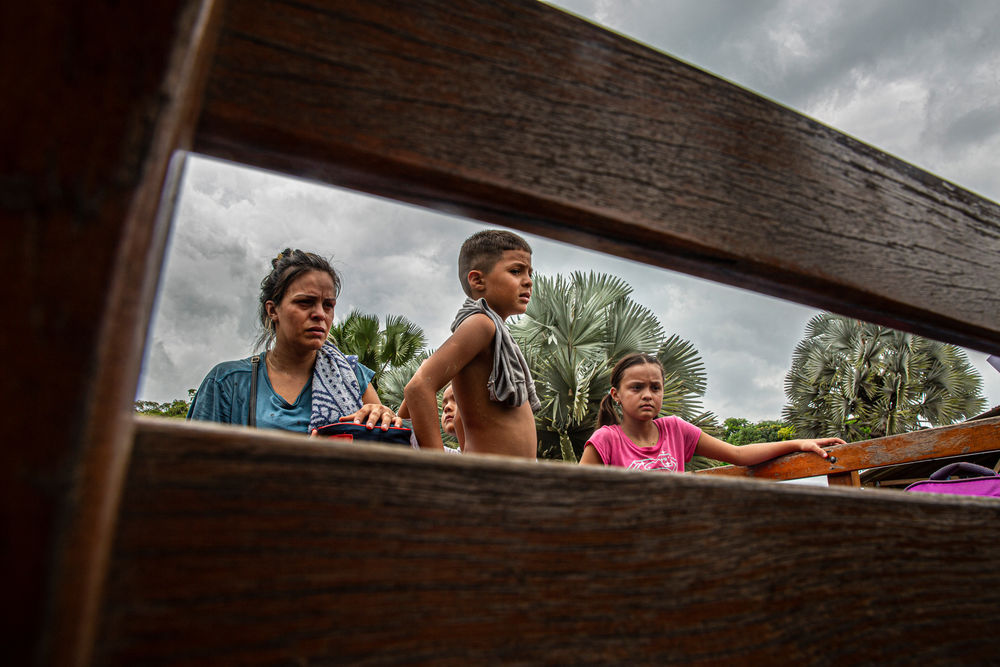Since Libya's government collapse in 2011, the country has faced severe fragmentation. Migrants and refugees are routinely targeted by armed groups, traffickers, and state actors. Libyan law criminalises irregular migration, without distinguishing between asylum seekers, trafficking victims, or vulnerable individuals.
This legal vacuum has led to widespread arbitrary detention, torture, sexual violence, and forced labour. Many people are intercepted at sea and forcibly returned to Libya, where they face renewed cycles of abuse.
In 2024, Médecins Sans Frontières (MSF) launched Humans in Transit, decided to select 400 of their testimonies and create an artistic tool to advocate, campaign and communicate.
Each of the 400 portraits in this exhibition has been created by one of four artists, who were inspired to put a face to every story. Their images bring alive the faceless statistics of individuals who have endured physical abuse, kidnapping and sexual violence in their search for refuge, and pay tribute to their resilience and enduring human spirit. Every face represents a human being deserving of compassion and safety.
The Humans in transit exhibit is a collective act of storytelling from refugees. The full exhibit is available in digital format. Below is a selection of eight of the 400 testimonies and portraits.
32-year-old woman from Morocco, testimony taken from a search and rescue boat, 2017

I moved to Libya in 2009. My sister in Zawiya helped me find a house and job. I worked as a domestic help for four years, then took a job in a bar.
In 2013 a gang kidnapped me. For the next week I was raped daily by 20 men. I almost died. Then they threw me out on the street. I stayed home for seven months, seeing nobody except my sister.
The day I decided to go out again, I was kidnapped by another gang. They took me to a farm where again I was raped every day by several men before they left me on the street.
In 2015 I married a man. He was nice at first, but when I got pregnant, he beat my belly until I lost the baby. Last month I discovered I was pregnant again, so I escaped and hid with a friend.
Artwork by Souad Kokash
18-year-old woman from Nigeria, testimony taken from a search and rescue boat, 2016

My father was pressuring me to marry a man he owed money to, but my mother refused so my father said I had to leave.
I went to Benin City with friends. We met a man who said he’d take us to Europe to work for good wages. But in Libya he took us to a brothel. I refused to work so they starved me and kept beating me every day. Eventually I gave in. At first I bled a lot and needed treatment. They said they would add the cost to what they claimed I owed them.
Once I tried to escape but they brought me back and beat me badly. Several times I was abducted by Arabs who beat me with guns and raped me. Finally I did escape, and an Arab helped me – he drove me to Subratha and paid for me to cross to Europe.
Artwork by Souad Kokash
35-year-old man from Bangladesh, testimony taken from Libya, 2017

A middleman convinced me to go to Libya for work – he said the economy was booming. He asked for 800,000 taka but we didn’t have that much, so he agreed to take 200,000 taka and the rest he would arrange.
When I got to Tripoli some Libyans drove me and 11 others to a house in a car with blacked-out windows. They made me tell my family to pay money to the middleman. I thought that now they would give me a job – but they had no job for me.
Later I was stopped by police and beaten up – they stole my money and phone.
Finally I met a Bangladeshi man who helped me get a boat. He handed me to some people who kept me locked in a room for two weeks with very little food or water before taking me to the boat. My mind has been affected.
Artwork by Tawab Safi
16-year-old boy from Eritrea, testimony taken from Libya, 2021

I came to Libya last February and was detained in Bani Walid until they transferred me to the Ghut Shaal detention centre in Tripoli - the worst place I’ve ever been. There were 400 of us sleeping in a room barely big enough for 50. There were no windows and people kept fainting whenever the guards opened the door.
The food was disgusting, and we believed they were adding sleeping pills to it. But the worst part was the detainees who worked with the guards. They used to torture us and tell the guards about anything that happened in the cells, like when we tried digging through the wall with a spoon.
When they said they were transferring the Sudanese I pretended to be one. We escaped from the new detention centre and ran for our lives. Since then I’ve been here, with no work, no income and no food.
Artwork by Tawab Safi
27-year-old woman from Nigeria, testimony taken from a search and rescue boat, 2016

I left because people in my village wanted to do FGM [female genital mutilation] to my daughter. We hid with my friend Ella in another village. For a while it was good. We both worked – me as a hairdresser and Ella in a bank. Then Ella’s uncle decided to marry her to his older friend. They locked her up until they could arrange the wedding.
One night we escaped. We heard there was work in Libya, but we ended up in a trap. We were locked in a house. They tried to force us into prostitution. When we refused, they beat us. One night they let us go. We were in a big crowd, being herded to the sea. I thought they would kill us. Instead they put us on a rubber boat. Nobody asked us if we wanted to go. We didn’t choose to come, but we cannot go back.
Artwork by Barly Tshibanda
28-year-old woman from Nigeria, testimony taken from a search and rescue boat, 2016

I will never get married. I want nothing romantic to do with men because all my experiences have been evil. I lost my virginity traumatically and was raped as a teenager – and that was just the start.
I turned down my university place to study medicine after my sister’s boyfriend promised me that I could earn good money in Libya. When I got there, I was shocked to find he expected me to work as a prostitute. When I refused, he starved me and beat me with leather belts. Eventually I gave in and began to attend to the needs of his many guests. One day I was raped by seven men who came looking for revenge after he shot someone. I was in hospital for two months. A friend nursed me back to health. After several attempts, I got on a boat to Europe.
Artwork by Barly Tshibanda
55-year-old man from Pakistan, testimony taken from a search and rescue boat, 2017

I was working for a UN immunisation programme, giving polio drops to children in the mountains near Afghanistan, but people threatened to kill my family because they thought the programme was trying to sterilise their children. I decided to leave to stop the threats and flew to Tripoli. I started working as a labourer to support my family back home, but at one point I was kidnapped, and all my money was taken.
When we were in the boat, the Libyan Coast Guard came. Two of them jumped in the boat with guns, took our money and phones, drove us to the limit of Libyan territorial waters and left us there. Then another boat came and took our motor.
Now I want to ask for asylum and hopefully bring my family to join me, as the situation in Pakistan is difficult.
Artwork by Artwork by Ngadi Smart
25-year-old woman from Ivory Coast, testimony taken from a search and rescue boat, 2017

I was held in a cabin with eight other women. At night when there were no guards we went out to find food – a piece of bread in the street or anything.
One night Arabs took us to a house, tied us up with our legs spread and raped us. They beat us too. Even after they untied me I couldn’t walk. Next night they raped us again. Then we escaped and went back to the cabin.
I don’t know how long we stayed there. One night armed men blindfolded us and took us to a warehouse in Sabratha. Next day they beat us with rubber pipes. Two girls died. Sometimes we went two or three days without food. Eventually we were taken to the sea. We panicked so they beat us again, but then they put us on a boat.
I’m pregnant now but what can I do?
Artwork by Ngadi Smart
From 2016-2023, MSF provided medical and humanitarian care- including general healthcare, mental health support, referrals of life-threatening conditions to specialist healthcare facilities, and the facilitation of access to protection services to people arbitrarily detained, often in violent and inhumane conditions, in detention centres across Tripoli. MSF has operated search and rescue activities in the central Mediterranean since 2015, working on eight different Search and Rescue (SAR) vessels and rescuing more than 94,000 people. In December 2024, MSF was forced to cease operations on board its latest SAR vessel, Geo Barents, but remains committed to returning to Central Mediterranean Sea.



